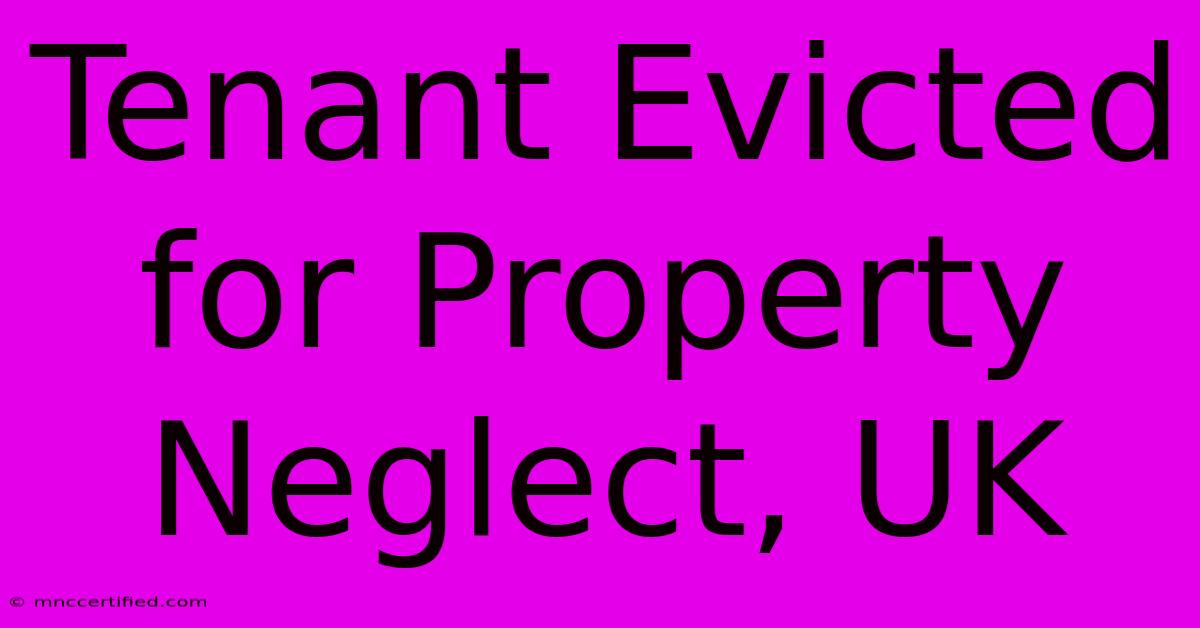Tenant Evicted For Property Neglect, UK

Table of Contents
Tenant Evicted for Property Neglect, UK: A Comprehensive Guide
Landlords in the UK have the right to evict tenants for property neglect. This isn't a decision taken lightly, and specific legal processes must be followed. Understanding these processes is crucial for both landlords and tenants. This article will outline the grounds for eviction related to property neglect, the legal procedures involved, and the rights and responsibilities of both parties.
Grounds for Eviction Due to Property Neglect
In the UK, a landlord can pursue eviction based on a tenant's breach of the tenancy agreement. Neglect leading to disrepair falls under this breach. This can include, but isn't limited to:
-
Damage to the property: Significant damage beyond reasonable wear and tear. This could involve broken windows, damaged walls, or destruction of fixtures and fittings. Evidence is key; photographs and documented reports are essential.
-
Failure to maintain cleanliness: Excessive dirt, infestation (e.g., vermin, mold), and unsanitary conditions that pose a health risk. Local council involvement might be necessary for severe cases.
-
Unreasonable damage to communal areas: If living in a shared property (flats, houses of multiple occupation), damaging communal areas like hallways or gardens constitutes grounds for eviction.
-
Breach of specific clauses: Tenancy agreements often contain clauses regarding property maintenance. Failing to comply with these clauses provides grounds for eviction. Examples include failing to properly dispose of waste or not maintaining garden areas.
-
Failure to report repairs: A tenant's failure to promptly report necessary repairs can also contribute to a case for eviction, especially if the unreported damage worsens.
Legal Procedures for Eviction
Evicting a tenant is a legally complex process in the UK. Landlords must adhere strictly to the legal framework, typically involving:
1. Serving a formal notice: The first step is serving the tenant with a formal notice, specifying the breach of contract and outlining the required actions. This notice must be served correctly, according to legal requirements, often involving certified mail or personal service. The type of notice depends on the nature of the breach and the type of tenancy. Section 8 notices are commonly used for breaches of tenancy agreements.
2. Giving the tenant reasonable time to rectify: The notice typically provides the tenant a reasonable timeframe to address the issues. The timeframe will vary depending on the severity of the neglect.
3. Seeking possession order from the court: If the tenant fails to rectify the situation within the given timeframe, the landlord must apply to the court for a possession order. This requires submitting evidence of the breach and the attempts made to resolve the situation.
4. Obtaining a warrant for possession: Once a possession order is granted, the landlord must obtain a warrant for possession from the court. This warrant authorizes the bailiffs to legally evict the tenant.
5. Eviction by bailiffs: The bailiffs will then carry out the eviction, removing the tenant from the property.
Rights and Responsibilities
Landlord's Responsibilities:
- Maintaining the property's structure: Landlords are responsible for structural repairs.
- Providing a safe and habitable environment: Basic standards of habitability must be met.
- Following the correct legal procedures: Strict adherence to legal procedures is crucial to avoid legal challenges.
- Providing clear communication: Landlords should clearly communicate expectations to their tenants.
Tenant's Responsibilities:
- Maintaining cleanliness and reasonable care: Tenants are expected to keep the property clean and prevent damage beyond reasonable wear and tear.
- Reporting necessary repairs promptly: Timely reporting of repairs prevents issues from escalating.
- Complying with the terms of the tenancy agreement: Adherence to the agreement is crucial.
Seeking Legal Advice
Eviction processes are complex. Both landlords and tenants should seek legal advice from qualified professionals if facing eviction issues. This ensures that all legal procedures are followed correctly and protects the rights of both parties. Citizens Advice and Shelter are valuable resources offering free legal advice.
Keywords: Tenant eviction UK, property neglect eviction, landlord tenant law UK, section 8 notice, possession order, eviction process UK, tenant rights UK, landlord responsibilities UK, property damage eviction, unclean property eviction, legal advice eviction UK.

Thank you for visiting our website wich cover about Tenant Evicted For Property Neglect, UK. We hope the information provided has been useful to you. Feel free to contact us if you have any questions or need further assistance. See you next time and dont miss to bookmark.
Featured Posts
-
Live Game Update Vikings Win 23 13
Nov 18, 2024
-
Leah Keane Featured In Roy Keanes Tattoo
Nov 18, 2024
-
Jones Wants Big Pay For Aspinall Fight
Nov 18, 2024
-
Henry Secures 500 000 Bonus Ravens News
Nov 18, 2024
-
87 000 A Year Is How Much An Hour
Nov 18, 2024